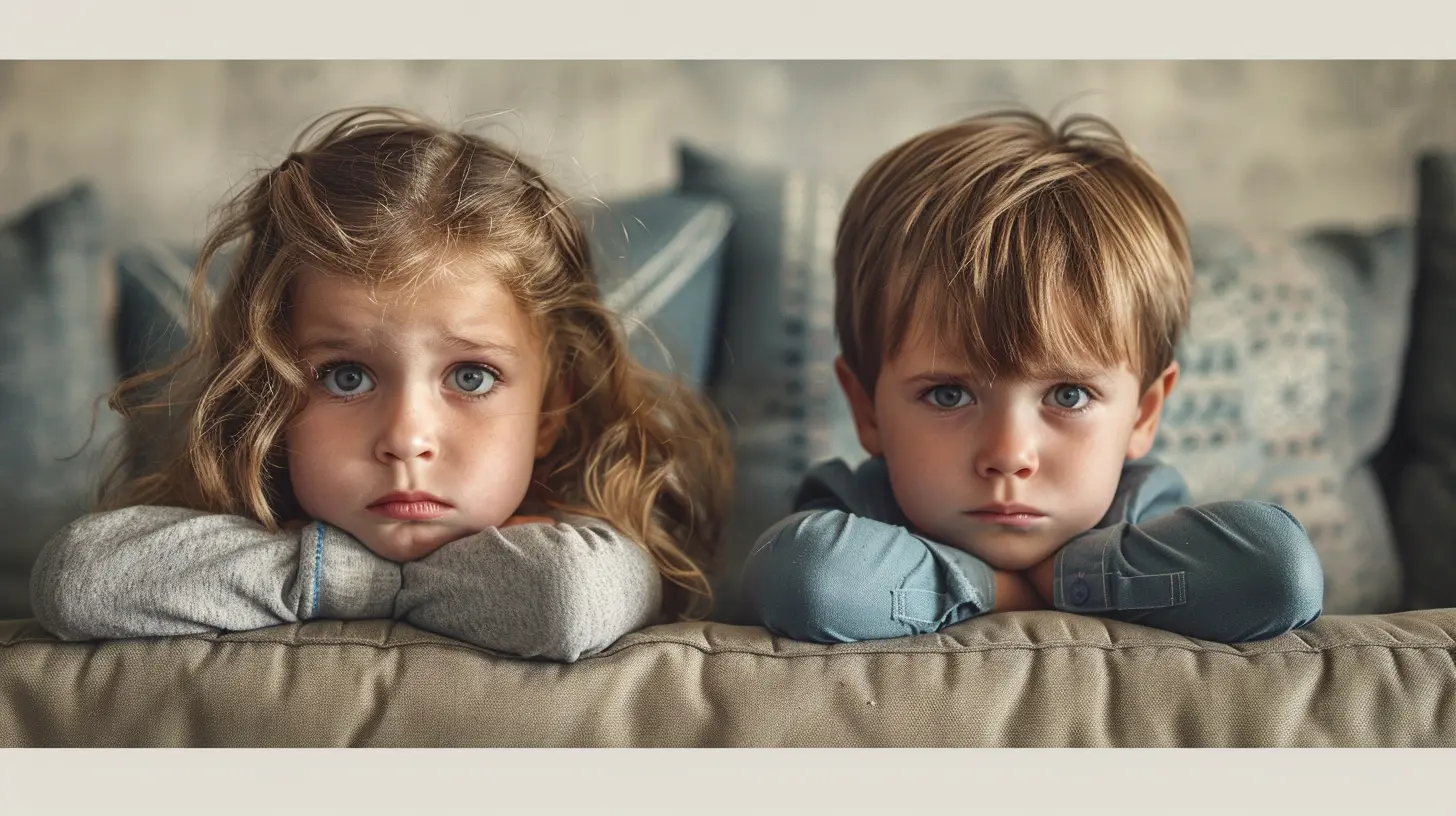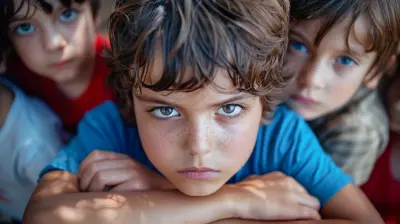Signs Your Child Needs Professional Support During Divorce
27 August 2025
Divorce. It’s a word packed with emotion, change, and uncertainty. When a relationship ends, it doesn't just impact the two adults involved—it sends ripples through the entire family, especially the children. While some kids bounce back with amazing resilience, others might carry invisible bruises that don’t show up right away. As a concerned parent, you may find yourself wondering, “How do I know if my child is really okay?”
Let’s cut through the confusion with a deep dive into the signs your child needs professional support during divorce. Sometimes what seems like a “phase” could actually be a cry for help. The sooner we recognize it, the better we can support their emotional journey.
Why Divorce Hits Kids Differently
Every child is unique. Some might take the news of a split like champs, while others crumble quietly inside. They’re processing big emotions with little experience to guide them. They may feel scared, confused, guilty, or even angry—and oftentimes, they don’t have the words to express it.Think of it like this: imagine trying to climb a mountain without a map or gear. That’s what navigating a divorce can feel like for a child. They need tools. And sometimes, they might need a guide.
1. Drastic Changes in Behavior
One of the first red flags? Behavior that seems way out of the norm. And no, we’re not talking about the occasional tantrum or moody teenager vibes. We’re talking about big shifts.What to Look For:
- Sudden aggression or irritability- Withdrawal from family and friends
- Becoming unusually clingy
- Loss of interest in favorite activities
- Constant defiance or rule-breaking
If your typically easy-going child suddenly starts lashing out or isolating, it might be more than just a phase. Think of it like their emotions are overflowing, and they don’t know how to manage the spill.
2. Emotional Outbursts That Don’t Match the Situation
All kids struggle with their emotions at times, but when your child’s reactions seem excessive or out of place, take note.Common Signs:
- Explosive anger over minor things- Frequent crying fits
- Anxiety levels that seem out of proportion
- Panic attacks or intense fears
If your child is melting down over a broken pencil or hiding in their room over a minor disagreement, it’s worth asking: Are they dealing with more than they can handle?
3. Regression to Younger Behaviors
Yep, this one can throw you for a loop.Your fully potty-trained five-year-old starts wetting the bed again. Or your independent ten-year-old suddenly wants to sleep in your bed every night. Regression is often a child’s way of expressing, “I don’t feel safe.”
Regressive Behaviors Might Include:
- Bedwetting- Thumb-sucking
- Baby talk
- Fear of being alone
- Wanting help with tasks they’ve long mastered
These signs don’t mean your child is being difficult—they’re showing you how overwhelmed they feel. Sometimes, even when kids can’t say it, their actions scream it.
4. Academic Struggles
Let’s face it: school isn’t just about grades. It’s a huge part of your child’s social and emotional world. A shift in their performance at school could be a major clue that something’s up.Warning Signs to Pay Attention To:
- Declining grades- Trouble concentrating
- Increased absences or tardiness
- Complaints about stomachaches or headaches (especially before school)
- Negative changes in attitude toward school or teachers
Teachers might be the first to spot these changes, so stay in the loop with them. If school becomes a battleground, it’s a sign your child may be emotionally taxed beyond their limits.
5. Difficulty Sleeping or Eating
Children process stress physically, just like adults. You may see it surface in how they sleep or eat.Your Child Might:
- Have trouble falling or staying asleep- Experience frequent nightmares
- Want to sleep all the time (especially teens)
- Lose their appetite or overeat
- Suddenly become picky or refuse food altogether
Body and mind are closely tied. If their sleep or eating habits have taken a nosedive, it could be their emotional distress leaking out through physical symptoms.
6. Expressing Guilt or Blame
This one’s heartbreaking. Many kids, especially younger ones, internalize the divorce and blame themselves. “If I hadn’t fought with my brother… maybe Mom and Dad wouldn’t be splitting up.”You might hear:
- “Is it because I was bad?”
- “Did I do something wrong?”
- “If I do better, will you get back together?”
Even if you’ve reassured them a hundred times, if they’re still expressing guilt, they may need someone neutral—a therapist—to help them truly understand it’s not their fault.
7. Avoiding One or Both Parents
Some kids become hesitant or even resistant to spending time with one of their parents after a divorce. This can spark alarm bells for several reasons.It May Indicate:
- The child feels caught in the middle- There’s underlying fear or tension
- The child is reacting to something they’ve seen or heard
- Parental alienation could be at play
Refusing to visit a parent or dreading transitions between households isn’t always about schedules—it may be the child’s way of protecting themselves from emotional discomfort they don’t know how to voice.
8. Talking About Self-Harm or Feeling Hopeless
Let’s not sugarcoat it—this is the most serious red flag. Divorce can cause powerful emotions, and in rare cases, kids may spiral into depression so deep they express dangerous thoughts.Statements like:
- “I wish I wasn’t here.”
- “Nobody would care if I disappeared.”
- “Things will never get better.”
These are cries for help that need immediate attention. Even if said in a moment of anger or sadness, it’s critical to take them seriously. Mental health professionals are trained to step in before things escalate.
9. You Feel Like You’ve Tried Everything
Sometimes you’ve pulled out every trick in your parenting toolbox—you’ve talked, cuddled, reassured, and maintained schedules. But your child still seems stuck in emotional quicksand.Listen to your gut. If something feels off, it probably is. Just like you’d take your child to a doctor for a lingering cough, taking them to a counselor for emotional symptoms is a step toward healing, not a sign of failure.
Why Professional Help Matters
You might be thinking, “But I’m doing everything I can—I’m here, I listen, I reassure.” And that’s amazing. But sometimes, kids need an outside person. Someone who isn’t in the thick of it. That’s where child therapists and counselors come in.They have the tools and training to help kids:
- Process emotions in a healthy way
- Identify and express their feelings
- Build coping skills for stress and change
- Navigate loyalty conflicts between parents
Getting professional support doesn't mean your child is broken or you're a bad parent. It means you're giving them the very best chance to heal and grow.
How to Talk to Your Child About Getting Help
So how do you bring it up? Keep it simple and gentle. You might say:> “Hey, I’ve noticed you’ve been feeling really big feelings lately. That’s totally okay. I think it might help to talk to someone whose job is to help kids feel better. What do you think?”
Frame it like giving them a coach or a helper—not someone to “fix” them, but someone in their corner.
When to Take the Next Step
If even one or two of the signs above ring true, it’s time to consider talking to a professional. Start by:- Reaching out to your child’s pediatrician
- Asking your school counselor for recommendations
- Looking into child psychologists or therapists in your area
And don’t worry—you’re not overreacting. You’re being proactive. That’s what strong parenting looks like.
Final Thoughts
Divorce is a major emotional event, and kids don’t have the same tools or language to process it as adults do. While some children adjust well with time and support from family, others might carry their pain quietly.By watching for the signs that your child is struggling, you're doing one of the most important jobs of all—showing up. With your love and the right help, your child can not only get through this chapter but come out stronger on the other side.
So, if your gut’s been telling you something’s off, trust it.
After all, there’s no one who knows your child better than you.
all images in this post were generated using AI tools
Category:
Divorce And KidsAuthor:

Tara Henson
Discussion
rate this article
1 comments
Uri McInnes
Such an important topic—thank you!
September 13, 2025 at 4:53 AM

Tara Henson
Thank you for your kind words! I'm glad you found the topic valuable.


